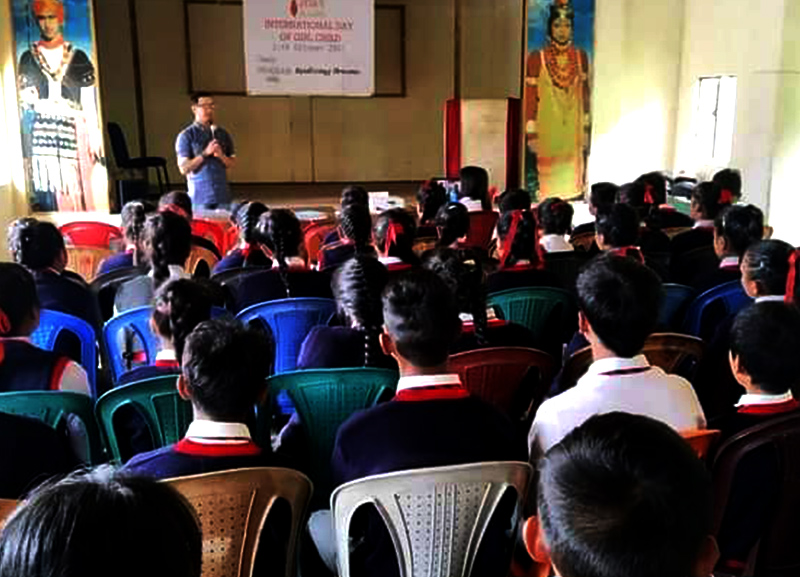- On 25th November 2019, The International Day for the elimination of violence against women was observed with the women from 3 villages. As a team the, initial plan was to share with them on an indigenous perspective the understanding of how violence against the land is violence against women. However, when the team sat with the women, they started sharing their challenges in the community and thus the discussion revolved around the 12 women sharing what they face as women and as a community. Thus, creating safe space to women to ventilate and express their challenges with the team and among the women.
- Women farmers are facing livelihood challenges. The climate has changed and their food production has been very poor which affects their income directly. Women have been investing in pesticides which they know is a threat to their health and they realised that now the same pesticides do not work anymore and new kind of bugs and insects are attacking their crops. Also women do not have any storage facility to preserve seeds and the hybrid seeds that they buy only causes a loss as they have to keep buying them every year. They feel that they cannot get out of poverty because of such situations. When speaking about discrimination and violence, women shared that their spouse do not appreciate them going out and to be part of groups or trainings. They share that each one of them feels that they are being controlled by their husbands however they are defying them and the women continue doing what they do. Women have huge concerned over their own community. Issues like teenage pregnancy, school drop outs, alcoholism, rise of tourist spot village and village land being sold to outsiders have become a safety issue for young children they said. There is an amount of trust between the team and the women to a certain extent that women shared their challenges with no hesitant. One very important observation is the women are very resilient. They are focussed and have stood up for their rights and have challenged their husbands who have tried to limit their movements.
- On 2nd December 2019, the International Day for Abolition of slavery was organised to observe this day with the 57 students of class X of Government Girls Higher Secondary Schools to bring about awareness with them on modern day slavery that exist to this date. We are living in a digital world and social media has become a pathway to many issues around girls and young children and how online social media is being used to groom and lure children, girls and women into being abused and trafficked knowing that children are the most vulnerable groups. We spread the awareness on modern slavery through social change photography facilitated by Mr. Clinton Massar He emphasized on the images which reflected the feelings of the rescued survivors of human trafficking. There were 10 photos posted on the wall taken by 10 rescued survivors. We also screened “girl rising” documentary. The story was of the girl name Suma from Nepal who was a bonded slave. The story is about the struggles and how she was able to get out of bonded slavery with the help of the organizations and how education put her back on her feet and as she grows she is able to help other girls get out of bonded slavery. The students shared their understandings of the realities of modern day slavery and the program opened their eyes to hear real life stories of survivors of modern day slavery. They were aware of slavery that exist in its various forms especially sex trafficking as it is shown on TV now.
- On the same day, the boys of Providence School under Project Raise and part of their project performed a role play on consent at the school premises.
- On 6th Decemeber 2019, the Zero Tolerance Day for Violence against women and girls was observed with 35 adolescent girls of Umsawriang, Umktieh and syllei-u-lar villages and also run the white ribbon campaign with the girls. We shared about the day and distributed white ribbons to mark the importance of the day. As the girls walked in they were introduced to a gallery of photos of programs held at the community and some of the girls have been part of our programs during the past few years recognised themselves. They were very excited and happy and it brought back memories of the past. On the day the main objective was to also assist girls to help them understand more about gender, social norms that are rooted deeply in their homes and communities. An interactive role play of what depicts the role of a man and a woman as seen by them constantly in their homes was enacted by them in groups. We have seen that all the girls and women play the same role in all types of family be it a doctor, teacher, farmer or a business family whereby the girls and women were the ones who had to take care of the family in household work and cooking. On seeing the outcome of the role play, we started sharing that both boys and girls are equal and if they shared the same responsibilities and respect each other’s then there will be less violence in the family as well as in the communities. We conclude by saying that Gender and social norms are so deeply rooted and even being a matrilineal community the structure is very patriarchal in nature.
- We also had exchange visits on this day, from Isha School based at Tamil Nadu that came with the organisations “Journey with Meanings” and we saw the girls openly share their stories and songs with the students. The students had interactions that centred around school, day to day activities and also sharing of traditions and culture through songs and martial arts.










